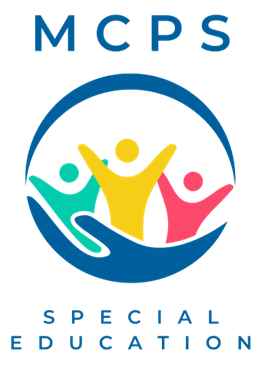 MONTGOMERY COUNTY PUBLIC SCHOOLS
MONTGOMERY COUNTY PUBLIC SCHOOLS
 MONTGOMERY COUNTY PUBLIC SCHOOLS
MONTGOMERY COUNTY PUBLIC SCHOOLS

Division of Specialized Support Services → Special Education Services

The eligibility of a student for special education and related services is based on a comprehensive evaluation process. That process includes considerations of assessments, information based on how well the student understands the curriculum, observation reports by educational professionals, teacher information, information provided by parents, and other relevant information.
The parents of the student, the student's teacher, the school administrator, a team of qualified special education professionals and other professionals who work with the student participate in the evaluation process to determine whether the student has a disability and is in need of special education and related services. Related services include speech and language therapy, occupational therapy, and physical therapy.
The determination of whether a student may have a disability is made by the student's parents and a team of qualified professionals which may include:
Before any decisions are made about whether a student needs special education services, a teacher or group of teachers at your student's school will work with parents/guardians in a process called "collaborative problem solving" or CPS. This process promotes the success of all students in the general education setting. Depending on your student's needs, the teacher or teachers will develop an intervention plan for assisting the student and document the impact of that intervention.
If your student's outcome does not improve, the case may be referred to a team based in the school, known as the Educational Management Team, or EMT. This team is made up of MCPS educators with expertise in teaching and learning, problem solving, and interventions. The team meets regularly and acts as a resource to all school staff members regarding students who are not meeting academic or behavior expectations.
The purpose of the EMT process is to ensure that all general education resources are being used to benefit the student and that the interventions are targeted and coordinated to help them achieve. An EMT may recommend a screening for consideration of special education services. Parents/guardians are critical participants throughout these processes.
In general, special education services provide specially designed instruction that involves modifications to the curriculum itself and/or the way the curriculum is taught to meet the specific needs of the student. Other special education-related services such as speech and language therapy, occupational therapy, or physical therapy may also be needed. These are just a few of the related services that could be provided.
Commonly referred to as an IEP, an individualized education program is a written plan that is designed for any student who receives special education and related services. IEPs are required for every special education student under the federal Individuals with Disabilities Education Act, or IDEA. The IEP describes the goals that are set for the student over the course of the school year and spells out any special supports needed to help achieve those goals. Parents/guardians are an important part of the IEP process.
Both students with IEPs and students with 504 plans have a documented disability or impairment. For students with an IEP, their disability has a significant educational impact, and requires the provision of direct specialized instruction, in addition to supplementary aids and services. Students with 504 plans have a documented impairment which substantially limits their ability to perform a major life activity. The major life activity may or may not be directly related to learning (i.e., a physical impairment that impacts mobility, but not learning). Students with 504 plans require targeted accommodations so they are able to access their educational program in the same manner their non-disabled peers do. Both processes require an evaluation by a duly constituted problem solving team.
In time, a student may no longer need special education services and may exit from a special education program. The IEP team must conduct an evaluation before determining that a student no longer requires special education services.